Research Proposal: NP Impact on Diabetes Care in Primary Care
VerifiedAdded on 2023/04/21
|28
|7933
|463
Report
AI Summary
This research proposal investigates the impact of nurse practitioners (NPs) on the quality and outcomes of diabetes care in primary care settings, addressing the increasing global burden of diabetes and the growing demand on primary care professionals. It highlights the potential of NPs to improve glycemic control, blood pressure, and cholesterol levels in diabetic patients, thereby alleviating the strain on primary care physicians and promoting a nurse-led model of care. The proposal outlines the research question, aims, and objectives, focusing on measuring the outcomes achieved by NPs, evaluating their impact on patient health and self-management skills, and recommending steps for their complete integration into primary care. The study aims to provide evidence-based insights for policymakers and healthcare managers to consider substituting physicians with NPs and improving the overall quality of diabetes care.
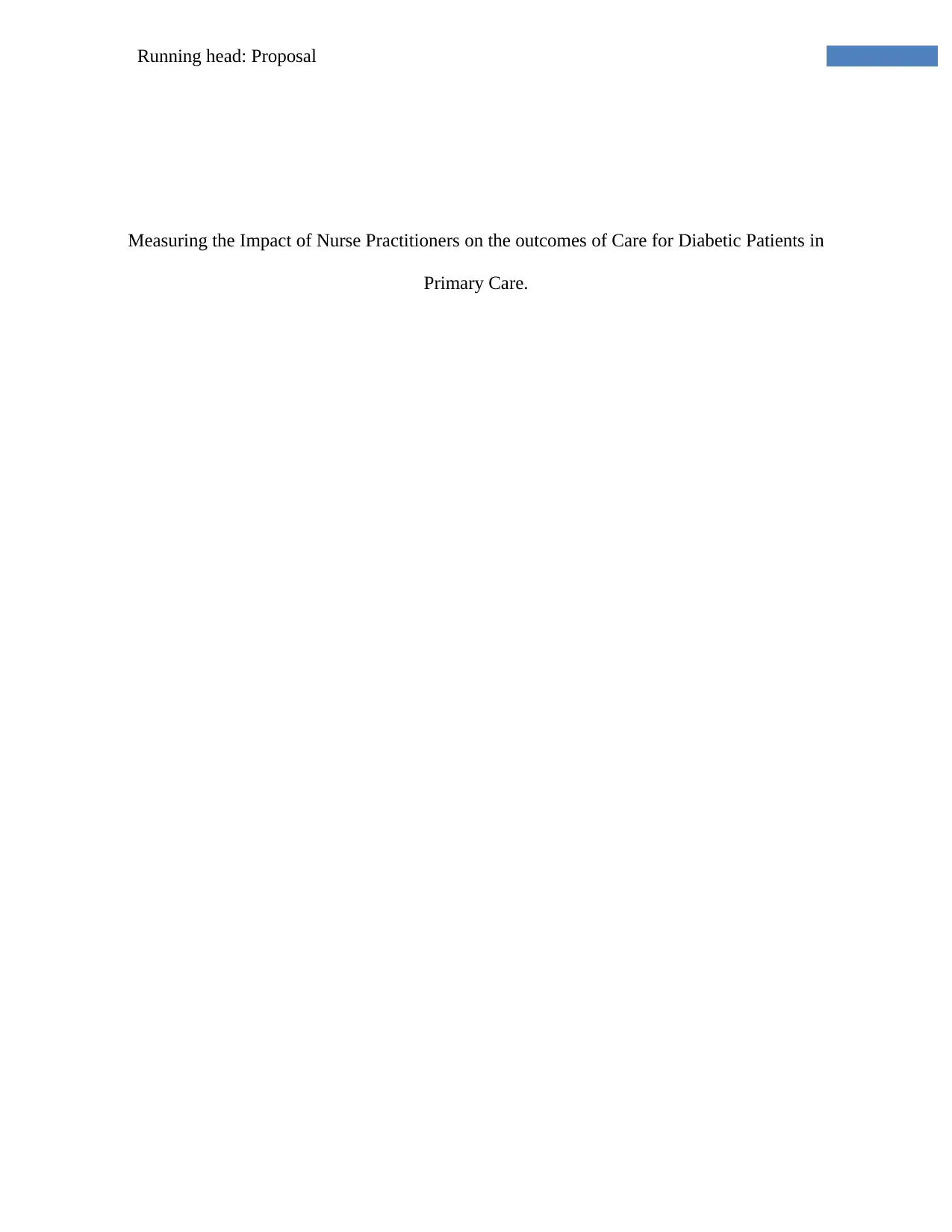
Running head: Proposal
Measuring the Impact of Nurse Practitioners on the outcomes of Care for Diabetic Patients in
Primary Care.
Measuring the Impact of Nurse Practitioners on the outcomes of Care for Diabetic Patients in
Primary Care.
Paraphrase This Document
Need a fresh take? Get an instant paraphrase of this document with our AI Paraphraser
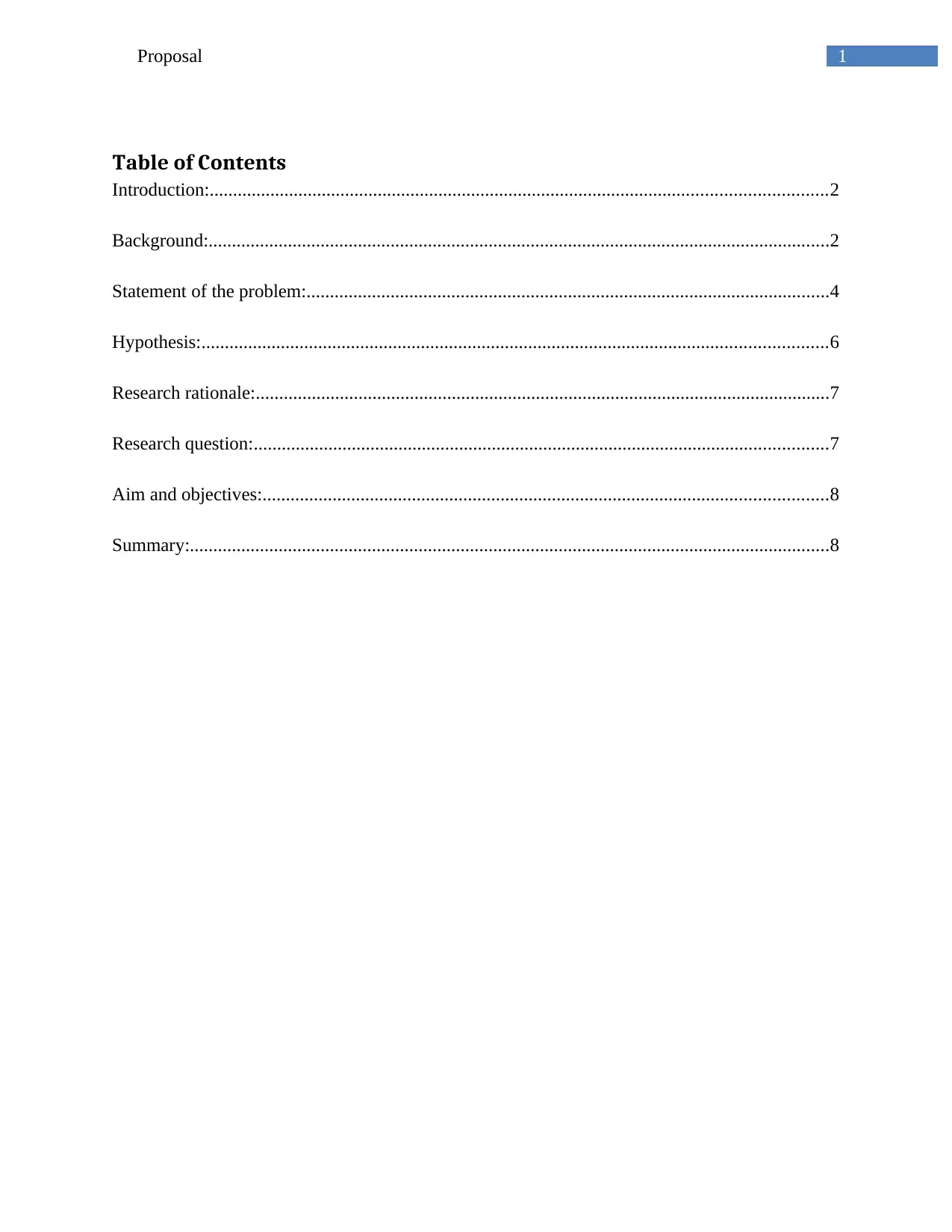
1Proposal
Table of Contents
Introduction:....................................................................................................................................2
Background:.....................................................................................................................................2
Statement of the problem:................................................................................................................4
Hypothesis:......................................................................................................................................6
Research rationale:...........................................................................................................................7
Research question:...........................................................................................................................7
Aim and objectives:.........................................................................................................................8
Summary:.........................................................................................................................................8
Table of Contents
Introduction:....................................................................................................................................2
Background:.....................................................................................................................................2
Statement of the problem:................................................................................................................4
Hypothesis:......................................................................................................................................6
Research rationale:...........................................................................................................................7
Research question:...........................................................................................................................7
Aim and objectives:.........................................................................................................................8
Summary:.........................................................................................................................................8
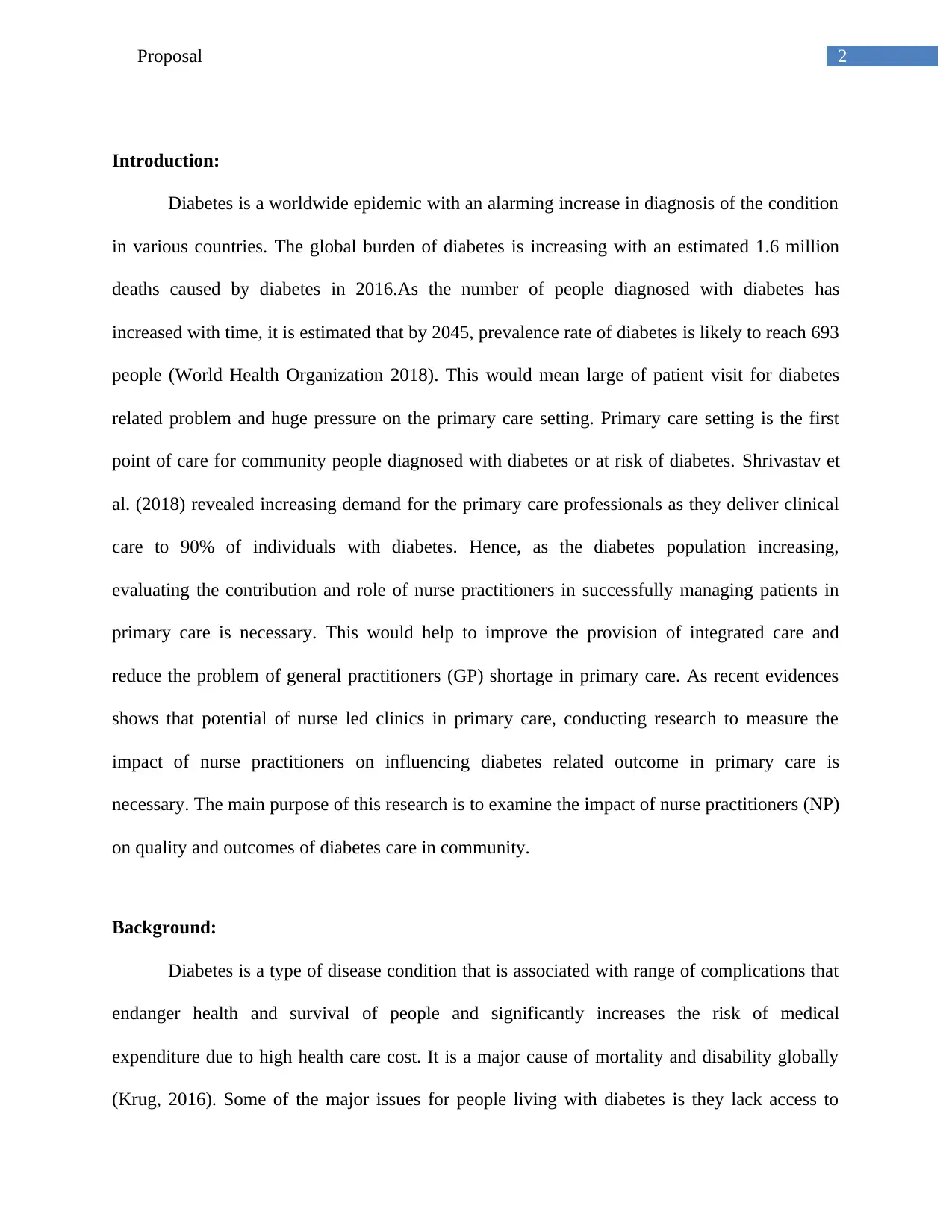
2Proposal
Introduction:
Diabetes is a worldwide epidemic with an alarming increase in diagnosis of the condition
in various countries. The global burden of diabetes is increasing with an estimated 1.6 million
deaths caused by diabetes in 2016.As the number of people diagnosed with diabetes has
increased with time, it is estimated that by 2045, prevalence rate of diabetes is likely to reach 693
people (World Health Organization 2018). This would mean large of patient visit for diabetes
related problem and huge pressure on the primary care setting. Primary care setting is the first
point of care for community people diagnosed with diabetes or at risk of diabetes. Shrivastav et
al. (2018) revealed increasing demand for the primary care professionals as they deliver clinical
care to 90% of individuals with diabetes. Hence, as the diabetes population increasing,
evaluating the contribution and role of nurse practitioners in successfully managing patients in
primary care is necessary. This would help to improve the provision of integrated care and
reduce the problem of general practitioners (GP) shortage in primary care. As recent evidences
shows that potential of nurse led clinics in primary care, conducting research to measure the
impact of nurse practitioners on influencing diabetes related outcome in primary care is
necessary. The main purpose of this research is to examine the impact of nurse practitioners (NP)
on quality and outcomes of diabetes care in community.
Background:
Diabetes is a type of disease condition that is associated with range of complications that
endanger health and survival of people and significantly increases the risk of medical
expenditure due to high health care cost. It is a major cause of mortality and disability globally
(Krug, 2016). Some of the major issues for people living with diabetes is they lack access to
Introduction:
Diabetes is a worldwide epidemic with an alarming increase in diagnosis of the condition
in various countries. The global burden of diabetes is increasing with an estimated 1.6 million
deaths caused by diabetes in 2016.As the number of people diagnosed with diabetes has
increased with time, it is estimated that by 2045, prevalence rate of diabetes is likely to reach 693
people (World Health Organization 2018). This would mean large of patient visit for diabetes
related problem and huge pressure on the primary care setting. Primary care setting is the first
point of care for community people diagnosed with diabetes or at risk of diabetes. Shrivastav et
al. (2018) revealed increasing demand for the primary care professionals as they deliver clinical
care to 90% of individuals with diabetes. Hence, as the diabetes population increasing,
evaluating the contribution and role of nurse practitioners in successfully managing patients in
primary care is necessary. This would help to improve the provision of integrated care and
reduce the problem of general practitioners (GP) shortage in primary care. As recent evidences
shows that potential of nurse led clinics in primary care, conducting research to measure the
impact of nurse practitioners on influencing diabetes related outcome in primary care is
necessary. The main purpose of this research is to examine the impact of nurse practitioners (NP)
on quality and outcomes of diabetes care in community.
Background:
Diabetes is a type of disease condition that is associated with range of complications that
endanger health and survival of people and significantly increases the risk of medical
expenditure due to high health care cost. It is a major cause of mortality and disability globally
(Krug, 2016). Some of the major issues for people living with diabetes is they lack access to
⊘ This is a preview!⊘
Do you want full access?
Subscribe today to unlock all pages.

Trusted by 1+ million students worldwide
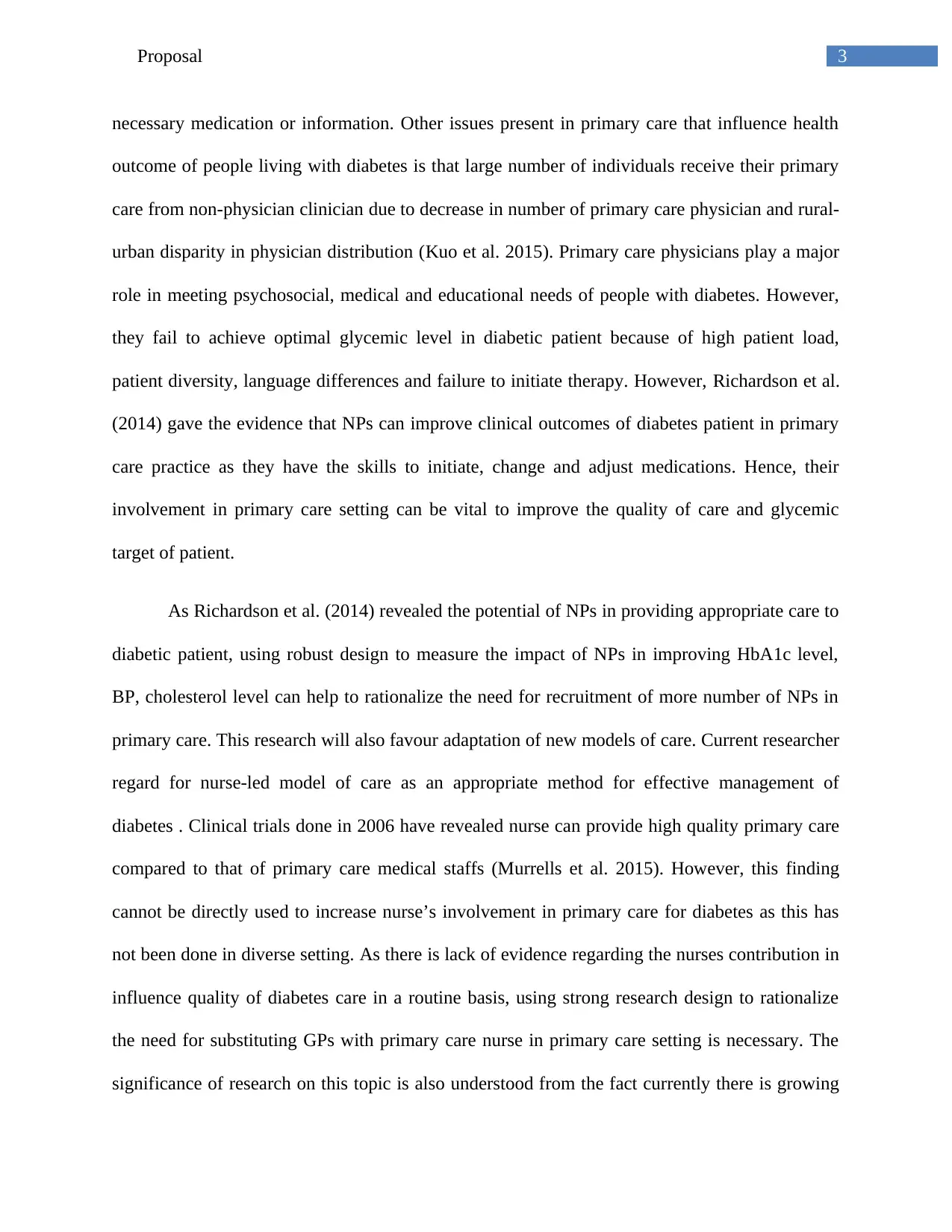
3Proposal
necessary medication or information. Other issues present in primary care that influence health
outcome of people living with diabetes is that large number of individuals receive their primary
care from non-physician clinician due to decrease in number of primary care physician and rural-
urban disparity in physician distribution (Kuo et al. 2015). Primary care physicians play a major
role in meeting psychosocial, medical and educational needs of people with diabetes. However,
they fail to achieve optimal glycemic level in diabetic patient because of high patient load,
patient diversity, language differences and failure to initiate therapy. However, Richardson et al.
(2014) gave the evidence that NPs can improve clinical outcomes of diabetes patient in primary
care practice as they have the skills to initiate, change and adjust medications. Hence, their
involvement in primary care setting can be vital to improve the quality of care and glycemic
target of patient.
As Richardson et al. (2014) revealed the potential of NPs in providing appropriate care to
diabetic patient, using robust design to measure the impact of NPs in improving HbA1c level,
BP, cholesterol level can help to rationalize the need for recruitment of more number of NPs in
primary care. This research will also favour adaptation of new models of care. Current researcher
regard for nurse-led model of care as an appropriate method for effective management of
diabetes . Clinical trials done in 2006 have revealed nurse can provide high quality primary care
compared to that of primary care medical staffs (Murrells et al. 2015). However, this finding
cannot be directly used to increase nurse’s involvement in primary care for diabetes as this has
not been done in diverse setting. As there is lack of evidence regarding the nurses contribution in
influence quality of diabetes care in a routine basis, using strong research design to rationalize
the need for substituting GPs with primary care nurse in primary care setting is necessary. The
significance of research on this topic is also understood from the fact currently there is growing
necessary medication or information. Other issues present in primary care that influence health
outcome of people living with diabetes is that large number of individuals receive their primary
care from non-physician clinician due to decrease in number of primary care physician and rural-
urban disparity in physician distribution (Kuo et al. 2015). Primary care physicians play a major
role in meeting psychosocial, medical and educational needs of people with diabetes. However,
they fail to achieve optimal glycemic level in diabetic patient because of high patient load,
patient diversity, language differences and failure to initiate therapy. However, Richardson et al.
(2014) gave the evidence that NPs can improve clinical outcomes of diabetes patient in primary
care practice as they have the skills to initiate, change and adjust medications. Hence, their
involvement in primary care setting can be vital to improve the quality of care and glycemic
target of patient.
As Richardson et al. (2014) revealed the potential of NPs in providing appropriate care to
diabetic patient, using robust design to measure the impact of NPs in improving HbA1c level,
BP, cholesterol level can help to rationalize the need for recruitment of more number of NPs in
primary care. This research will also favour adaptation of new models of care. Current researcher
regard for nurse-led model of care as an appropriate method for effective management of
diabetes . Clinical trials done in 2006 have revealed nurse can provide high quality primary care
compared to that of primary care medical staffs (Murrells et al. 2015). However, this finding
cannot be directly used to increase nurse’s involvement in primary care for diabetes as this has
not been done in diverse setting. As there is lack of evidence regarding the nurses contribution in
influence quality of diabetes care in a routine basis, using strong research design to rationalize
the need for substituting GPs with primary care nurse in primary care setting is necessary. The
significance of research on this topic is also understood from the fact currently there is growing
Paraphrase This Document
Need a fresh take? Get an instant paraphrase of this document with our AI Paraphraser
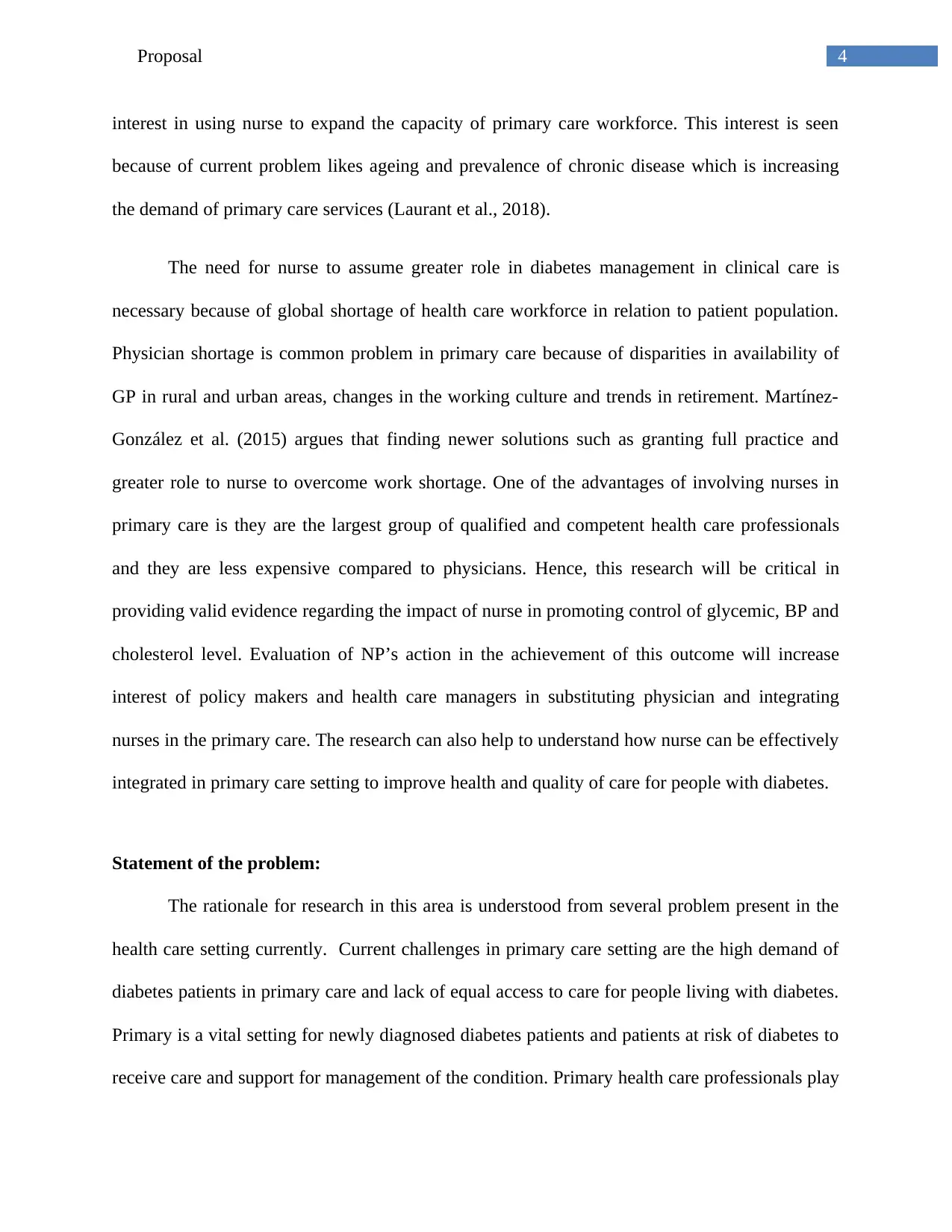
4Proposal
interest in using nurse to expand the capacity of primary care workforce. This interest is seen
because of current problem likes ageing and prevalence of chronic disease which is increasing
the demand of primary care services (Laurant et al., 2018).
The need for nurse to assume greater role in diabetes management in clinical care is
necessary because of global shortage of health care workforce in relation to patient population.
Physician shortage is common problem in primary care because of disparities in availability of
GP in rural and urban areas, changes in the working culture and trends in retirement. Martínez-
González et al. (2015) argues that finding newer solutions such as granting full practice and
greater role to nurse to overcome work shortage. One of the advantages of involving nurses in
primary care is they are the largest group of qualified and competent health care professionals
and they are less expensive compared to physicians. Hence, this research will be critical in
providing valid evidence regarding the impact of nurse in promoting control of glycemic, BP and
cholesterol level. Evaluation of NP’s action in the achievement of this outcome will increase
interest of policy makers and health care managers in substituting physician and integrating
nurses in the primary care. The research can also help to understand how nurse can be effectively
integrated in primary care setting to improve health and quality of care for people with diabetes.
Statement of the problem:
The rationale for research in this area is understood from several problem present in the
health care setting currently. Current challenges in primary care setting are the high demand of
diabetes patients in primary care and lack of equal access to care for people living with diabetes.
Primary is a vital setting for newly diagnosed diabetes patients and patients at risk of diabetes to
receive care and support for management of the condition. Primary health care professionals play
interest in using nurse to expand the capacity of primary care workforce. This interest is seen
because of current problem likes ageing and prevalence of chronic disease which is increasing
the demand of primary care services (Laurant et al., 2018).
The need for nurse to assume greater role in diabetes management in clinical care is
necessary because of global shortage of health care workforce in relation to patient population.
Physician shortage is common problem in primary care because of disparities in availability of
GP in rural and urban areas, changes in the working culture and trends in retirement. Martínez-
González et al. (2015) argues that finding newer solutions such as granting full practice and
greater role to nurse to overcome work shortage. One of the advantages of involving nurses in
primary care is they are the largest group of qualified and competent health care professionals
and they are less expensive compared to physicians. Hence, this research will be critical in
providing valid evidence regarding the impact of nurse in promoting control of glycemic, BP and
cholesterol level. Evaluation of NP’s action in the achievement of this outcome will increase
interest of policy makers and health care managers in substituting physician and integrating
nurses in the primary care. The research can also help to understand how nurse can be effectively
integrated in primary care setting to improve health and quality of care for people with diabetes.
Statement of the problem:
The rationale for research in this area is understood from several problem present in the
health care setting currently. Current challenges in primary care setting are the high demand of
diabetes patients in primary care and lack of equal access to care for people living with diabetes.
Primary is a vital setting for newly diagnosed diabetes patients and patients at risk of diabetes to
receive care and support for management of the condition. Primary health care professionals play
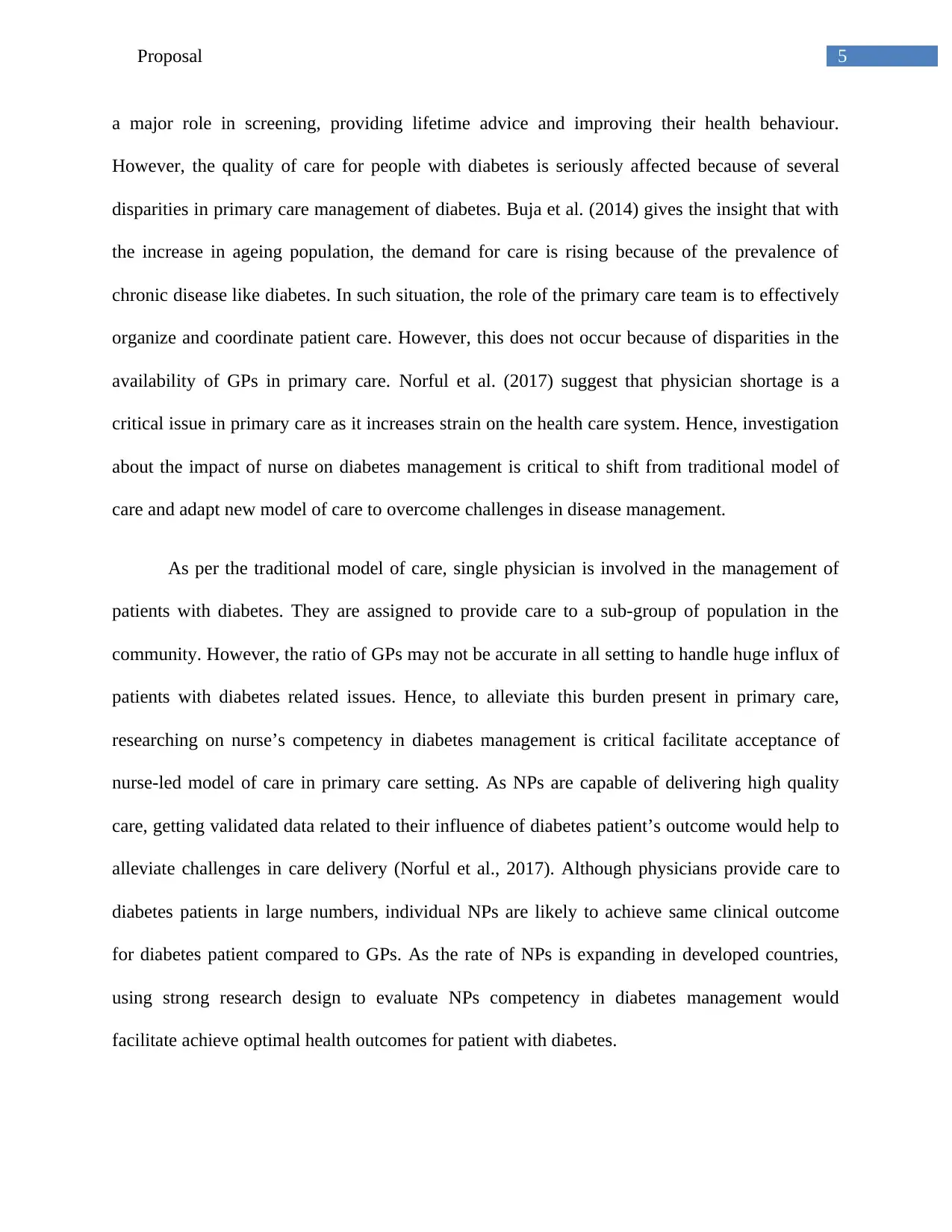
5Proposal
a major role in screening, providing lifetime advice and improving their health behaviour.
However, the quality of care for people with diabetes is seriously affected because of several
disparities in primary care management of diabetes. Buja et al. (2014) gives the insight that with
the increase in ageing population, the demand for care is rising because of the prevalence of
chronic disease like diabetes. In such situation, the role of the primary care team is to effectively
organize and coordinate patient care. However, this does not occur because of disparities in the
availability of GPs in primary care. Norful et al. (2017) suggest that physician shortage is a
critical issue in primary care as it increases strain on the health care system. Hence, investigation
about the impact of nurse on diabetes management is critical to shift from traditional model of
care and adapt new model of care to overcome challenges in disease management.
As per the traditional model of care, single physician is involved in the management of
patients with diabetes. They are assigned to provide care to a sub-group of population in the
community. However, the ratio of GPs may not be accurate in all setting to handle huge influx of
patients with diabetes related issues. Hence, to alleviate this burden present in primary care,
researching on nurse’s competency in diabetes management is critical facilitate acceptance of
nurse-led model of care in primary care setting. As NPs are capable of delivering high quality
care, getting validated data related to their influence of diabetes patient’s outcome would help to
alleviate challenges in care delivery (Norful et al., 2017). Although physicians provide care to
diabetes patients in large numbers, individual NPs are likely to achieve same clinical outcome
for diabetes patient compared to GPs. As the rate of NPs is expanding in developed countries,
using strong research design to evaluate NPs competency in diabetes management would
facilitate achieve optimal health outcomes for patient with diabetes.
a major role in screening, providing lifetime advice and improving their health behaviour.
However, the quality of care for people with diabetes is seriously affected because of several
disparities in primary care management of diabetes. Buja et al. (2014) gives the insight that with
the increase in ageing population, the demand for care is rising because of the prevalence of
chronic disease like diabetes. In such situation, the role of the primary care team is to effectively
organize and coordinate patient care. However, this does not occur because of disparities in the
availability of GPs in primary care. Norful et al. (2017) suggest that physician shortage is a
critical issue in primary care as it increases strain on the health care system. Hence, investigation
about the impact of nurse on diabetes management is critical to shift from traditional model of
care and adapt new model of care to overcome challenges in disease management.
As per the traditional model of care, single physician is involved in the management of
patients with diabetes. They are assigned to provide care to a sub-group of population in the
community. However, the ratio of GPs may not be accurate in all setting to handle huge influx of
patients with diabetes related issues. Hence, to alleviate this burden present in primary care,
researching on nurse’s competency in diabetes management is critical facilitate acceptance of
nurse-led model of care in primary care setting. As NPs are capable of delivering high quality
care, getting validated data related to their influence of diabetes patient’s outcome would help to
alleviate challenges in care delivery (Norful et al., 2017). Although physicians provide care to
diabetes patients in large numbers, individual NPs are likely to achieve same clinical outcome
for diabetes patient compared to GPs. As the rate of NPs is expanding in developed countries,
using strong research design to evaluate NPs competency in diabetes management would
facilitate achieve optimal health outcomes for patient with diabetes.
⊘ This is a preview!⊘
Do you want full access?
Subscribe today to unlock all pages.

Trusted by 1+ million students worldwide
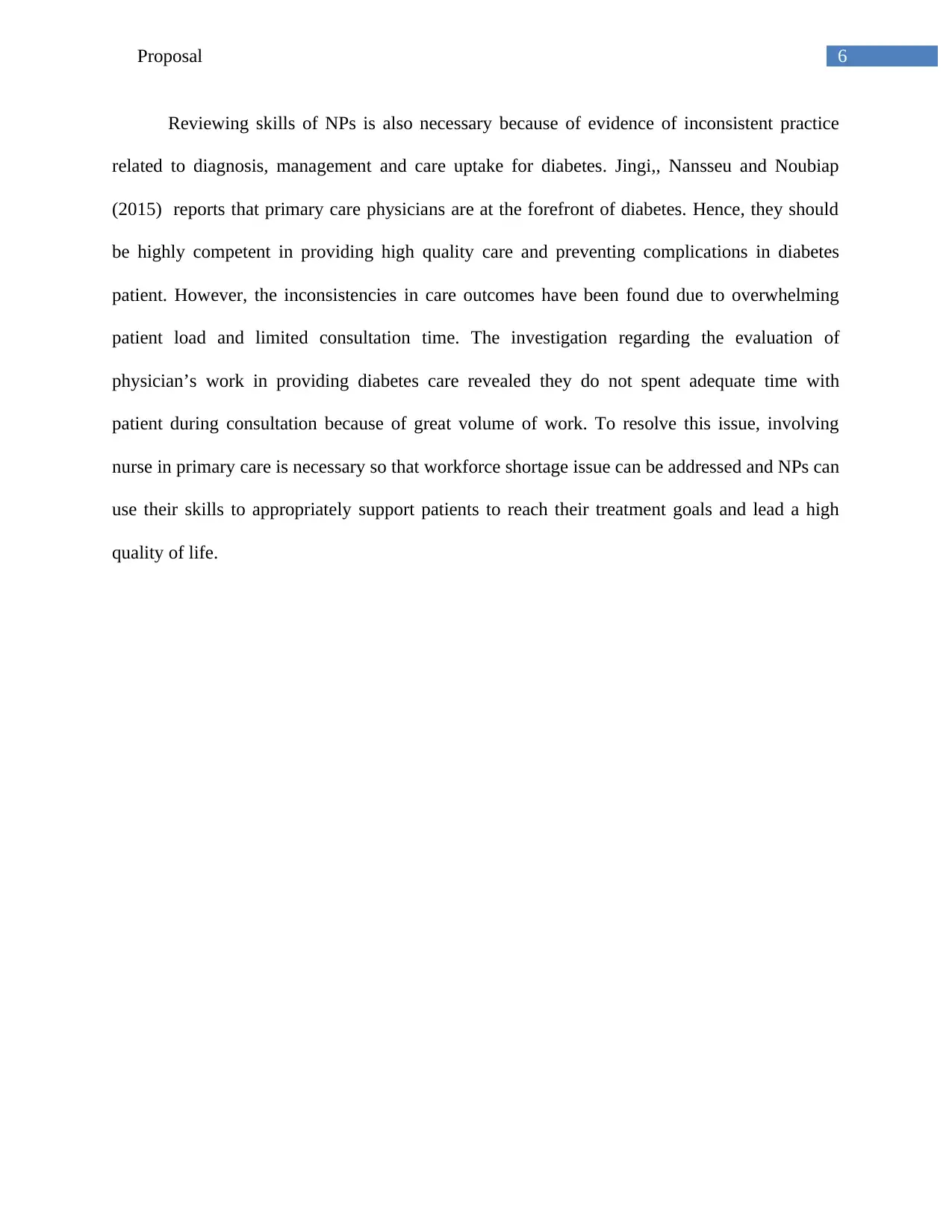
6Proposal
Reviewing skills of NPs is also necessary because of evidence of inconsistent practice
related to diagnosis, management and care uptake for diabetes. Jingi,, Nansseu and Noubiap
(2015) reports that primary care physicians are at the forefront of diabetes. Hence, they should
be highly competent in providing high quality care and preventing complications in diabetes
patient. However, the inconsistencies in care outcomes have been found due to overwhelming
patient load and limited consultation time. The investigation regarding the evaluation of
physician’s work in providing diabetes care revealed they do not spent adequate time with
patient during consultation because of great volume of work. To resolve this issue, involving
nurse in primary care is necessary so that workforce shortage issue can be addressed and NPs can
use their skills to appropriately support patients to reach their treatment goals and lead a high
quality of life.
Reviewing skills of NPs is also necessary because of evidence of inconsistent practice
related to diagnosis, management and care uptake for diabetes. Jingi,, Nansseu and Noubiap
(2015) reports that primary care physicians are at the forefront of diabetes. Hence, they should
be highly competent in providing high quality care and preventing complications in diabetes
patient. However, the inconsistencies in care outcomes have been found due to overwhelming
patient load and limited consultation time. The investigation regarding the evaluation of
physician’s work in providing diabetes care revealed they do not spent adequate time with
patient during consultation because of great volume of work. To resolve this issue, involving
nurse in primary care is necessary so that workforce shortage issue can be addressed and NPs can
use their skills to appropriately support patients to reach their treatment goals and lead a high
quality of life.
Paraphrase This Document
Need a fresh take? Get an instant paraphrase of this document with our AI Paraphraser
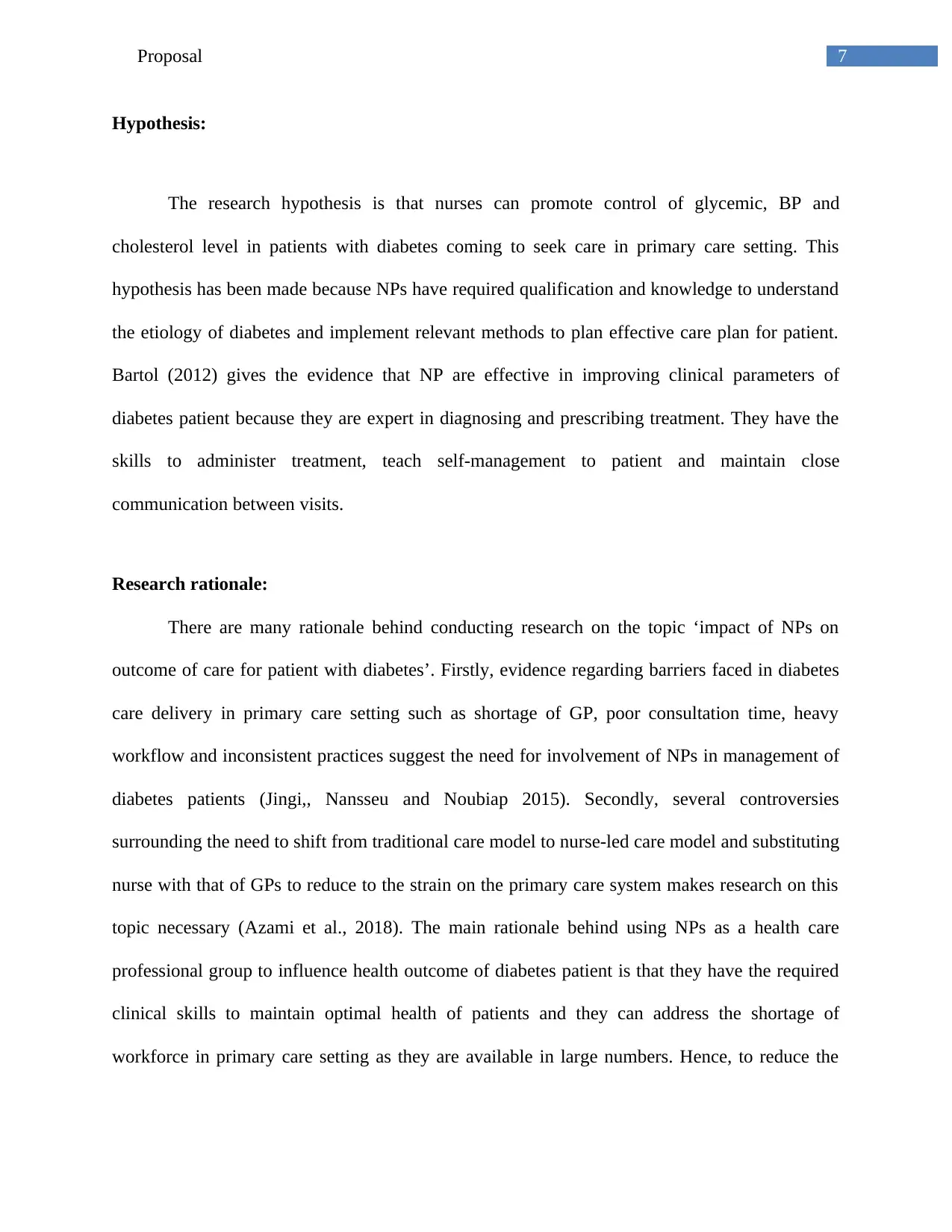
7Proposal
Hypothesis:
The research hypothesis is that nurses can promote control of glycemic, BP and
cholesterol level in patients with diabetes coming to seek care in primary care setting. This
hypothesis has been made because NPs have required qualification and knowledge to understand
the etiology of diabetes and implement relevant methods to plan effective care plan for patient.
Bartol (2012) gives the evidence that NP are effective in improving clinical parameters of
diabetes patient because they are expert in diagnosing and prescribing treatment. They have the
skills to administer treatment, teach self-management to patient and maintain close
communication between visits.
Research rationale:
There are many rationale behind conducting research on the topic ‘impact of NPs on
outcome of care for patient with diabetes’. Firstly, evidence regarding barriers faced in diabetes
care delivery in primary care setting such as shortage of GP, poor consultation time, heavy
workflow and inconsistent practices suggest the need for involvement of NPs in management of
diabetes patients (Jingi,, Nansseu and Noubiap 2015). Secondly, several controversies
surrounding the need to shift from traditional care model to nurse-led care model and substituting
nurse with that of GPs to reduce to the strain on the primary care system makes research on this
topic necessary (Azami et al., 2018). The main rationale behind using NPs as a health care
professional group to influence health outcome of diabetes patient is that they have the required
clinical skills to maintain optimal health of patients and they can address the shortage of
workforce in primary care setting as they are available in large numbers. Hence, to reduce the
Hypothesis:
The research hypothesis is that nurses can promote control of glycemic, BP and
cholesterol level in patients with diabetes coming to seek care in primary care setting. This
hypothesis has been made because NPs have required qualification and knowledge to understand
the etiology of diabetes and implement relevant methods to plan effective care plan for patient.
Bartol (2012) gives the evidence that NP are effective in improving clinical parameters of
diabetes patient because they are expert in diagnosing and prescribing treatment. They have the
skills to administer treatment, teach self-management to patient and maintain close
communication between visits.
Research rationale:
There are many rationale behind conducting research on the topic ‘impact of NPs on
outcome of care for patient with diabetes’. Firstly, evidence regarding barriers faced in diabetes
care delivery in primary care setting such as shortage of GP, poor consultation time, heavy
workflow and inconsistent practices suggest the need for involvement of NPs in management of
diabetes patients (Jingi,, Nansseu and Noubiap 2015). Secondly, several controversies
surrounding the need to shift from traditional care model to nurse-led care model and substituting
nurse with that of GPs to reduce to the strain on the primary care system makes research on this
topic necessary (Azami et al., 2018). The main rationale behind using NPs as a health care
professional group to influence health outcome of diabetes patient is that they have the required
clinical skills to maintain optimal health of patients and they can address the shortage of
workforce in primary care setting as they are available in large numbers. Hence, to reduce the
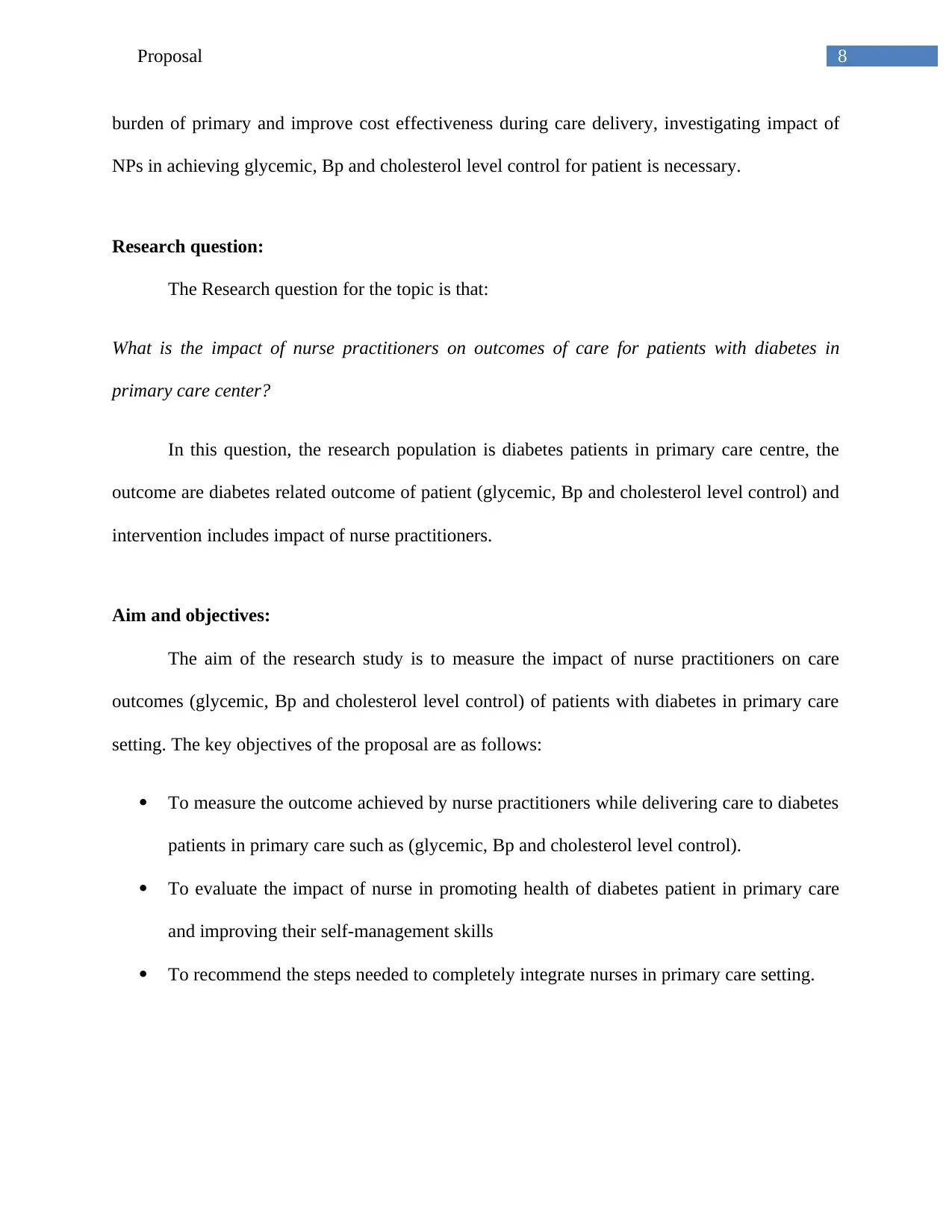
8Proposal
burden of primary and improve cost effectiveness during care delivery, investigating impact of
NPs in achieving glycemic, Bp and cholesterol level control for patient is necessary.
Research question:
The Research question for the topic is that:
What is the impact of nurse practitioners on outcomes of care for patients with diabetes in
primary care center?
In this question, the research population is diabetes patients in primary care centre, the
outcome are diabetes related outcome of patient (glycemic, Bp and cholesterol level control) and
intervention includes impact of nurse practitioners.
Aim and objectives:
The aim of the research study is to measure the impact of nurse practitioners on care
outcomes (glycemic, Bp and cholesterol level control) of patients with diabetes in primary care
setting. The key objectives of the proposal are as follows:
To measure the outcome achieved by nurse practitioners while delivering care to diabetes
patients in primary care such as (glycemic, Bp and cholesterol level control).
To evaluate the impact of nurse in promoting health of diabetes patient in primary care
and improving their self-management skills
To recommend the steps needed to completely integrate nurses in primary care setting.
burden of primary and improve cost effectiveness during care delivery, investigating impact of
NPs in achieving glycemic, Bp and cholesterol level control for patient is necessary.
Research question:
The Research question for the topic is that:
What is the impact of nurse practitioners on outcomes of care for patients with diabetes in
primary care center?
In this question, the research population is diabetes patients in primary care centre, the
outcome are diabetes related outcome of patient (glycemic, Bp and cholesterol level control) and
intervention includes impact of nurse practitioners.
Aim and objectives:
The aim of the research study is to measure the impact of nurse practitioners on care
outcomes (glycemic, Bp and cholesterol level control) of patients with diabetes in primary care
setting. The key objectives of the proposal are as follows:
To measure the outcome achieved by nurse practitioners while delivering care to diabetes
patients in primary care such as (glycemic, Bp and cholesterol level control).
To evaluate the impact of nurse in promoting health of diabetes patient in primary care
and improving their self-management skills
To recommend the steps needed to completely integrate nurses in primary care setting.
⊘ This is a preview!⊘
Do you want full access?
Subscribe today to unlock all pages.

Trusted by 1+ million students worldwide
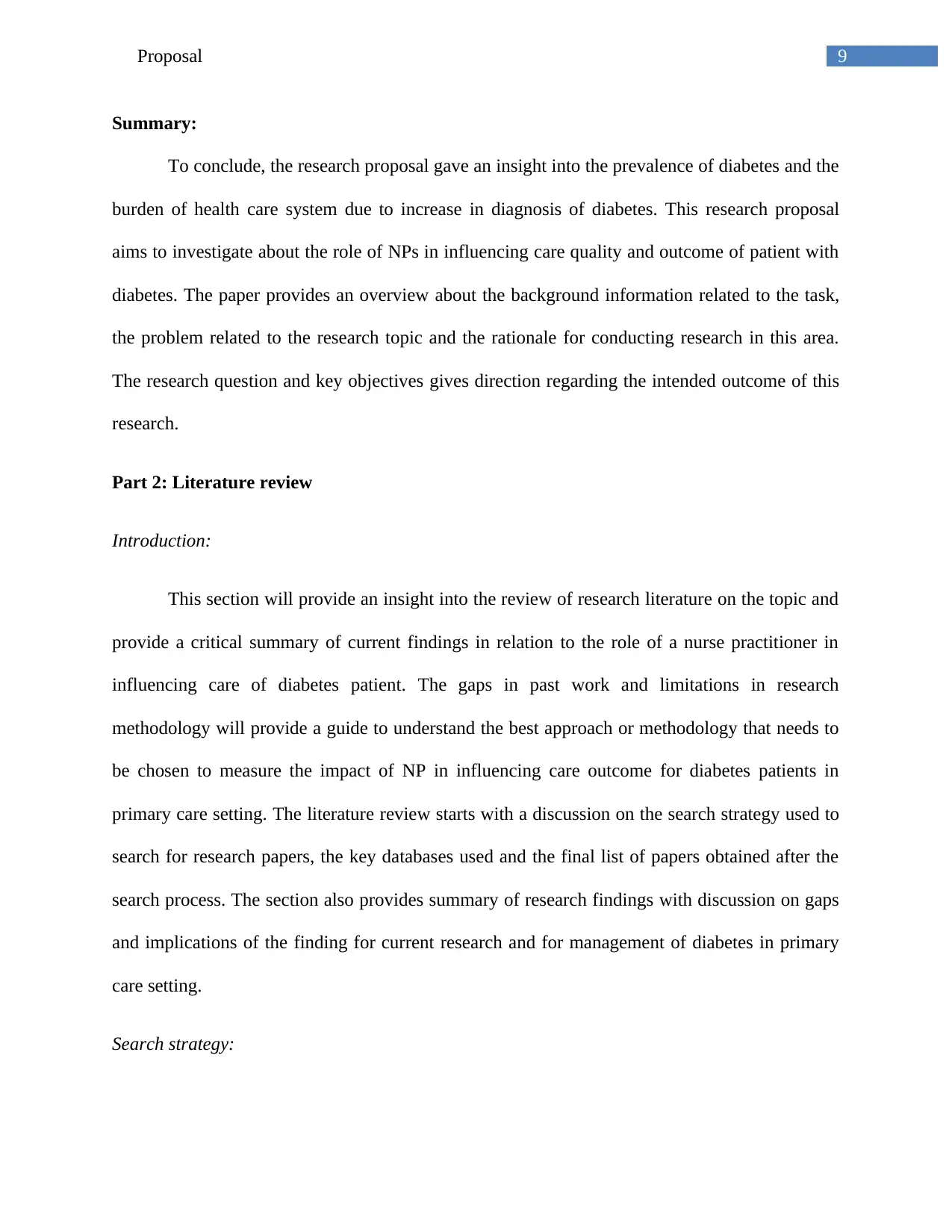
9Proposal
Summary:
To conclude, the research proposal gave an insight into the prevalence of diabetes and the
burden of health care system due to increase in diagnosis of diabetes. This research proposal
aims to investigate about the role of NPs in influencing care quality and outcome of patient with
diabetes. The paper provides an overview about the background information related to the task,
the problem related to the research topic and the rationale for conducting research in this area.
The research question and key objectives gives direction regarding the intended outcome of this
research.
Part 2: Literature review
Introduction:
This section will provide an insight into the review of research literature on the topic and
provide a critical summary of current findings in relation to the role of a nurse practitioner in
influencing care of diabetes patient. The gaps in past work and limitations in research
methodology will provide a guide to understand the best approach or methodology that needs to
be chosen to measure the impact of NP in influencing care outcome for diabetes patients in
primary care setting. The literature review starts with a discussion on the search strategy used to
search for research papers, the key databases used and the final list of papers obtained after the
search process. The section also provides summary of research findings with discussion on gaps
and implications of the finding for current research and for management of diabetes in primary
care setting.
Search strategy:
Summary:
To conclude, the research proposal gave an insight into the prevalence of diabetes and the
burden of health care system due to increase in diagnosis of diabetes. This research proposal
aims to investigate about the role of NPs in influencing care quality and outcome of patient with
diabetes. The paper provides an overview about the background information related to the task,
the problem related to the research topic and the rationale for conducting research in this area.
The research question and key objectives gives direction regarding the intended outcome of this
research.
Part 2: Literature review
Introduction:
This section will provide an insight into the review of research literature on the topic and
provide a critical summary of current findings in relation to the role of a nurse practitioner in
influencing care of diabetes patient. The gaps in past work and limitations in research
methodology will provide a guide to understand the best approach or methodology that needs to
be chosen to measure the impact of NP in influencing care outcome for diabetes patients in
primary care setting. The literature review starts with a discussion on the search strategy used to
search for research papers, the key databases used and the final list of papers obtained after the
search process. The section also provides summary of research findings with discussion on gaps
and implications of the finding for current research and for management of diabetes in primary
care setting.
Search strategy:
Paraphrase This Document
Need a fresh take? Get an instant paraphrase of this document with our AI Paraphraser
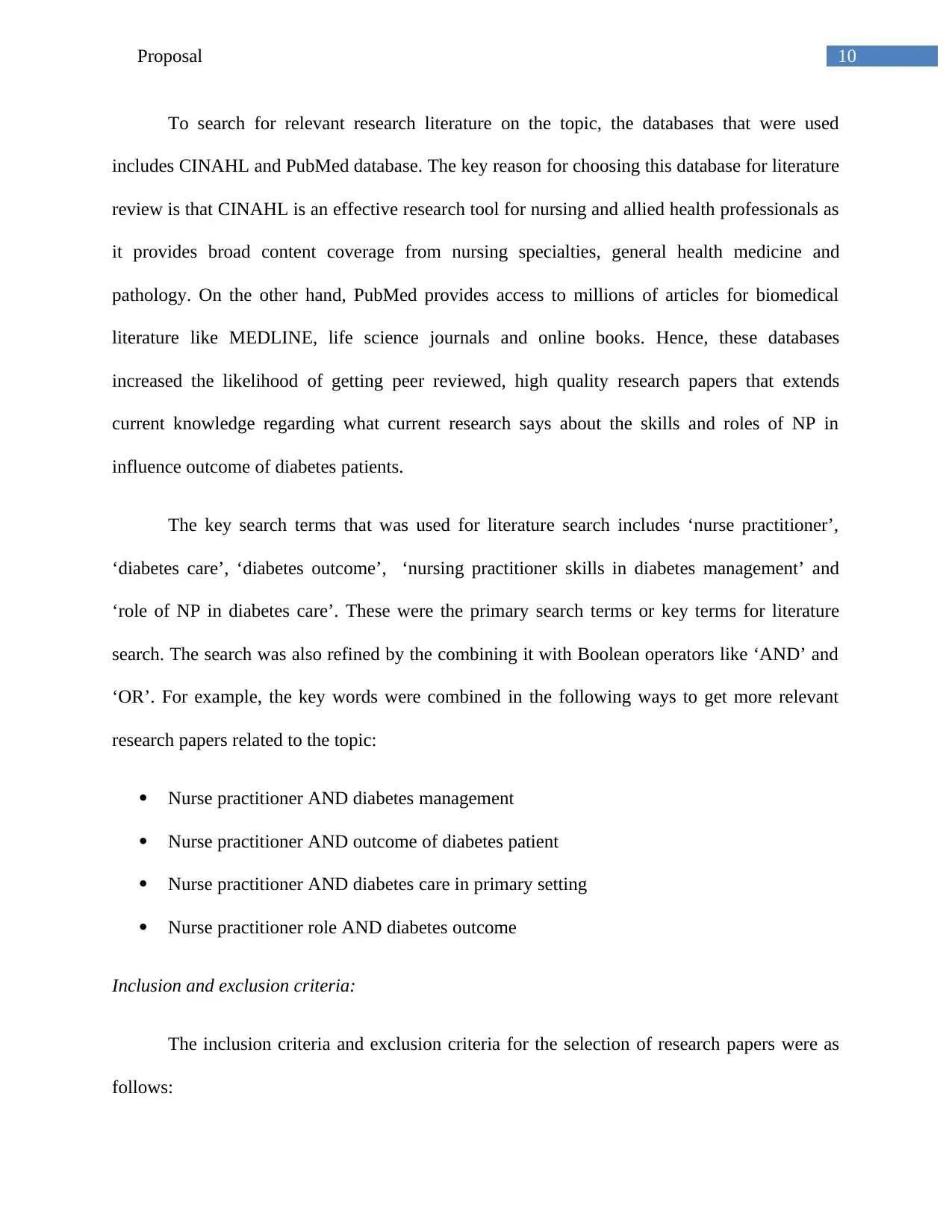
10Proposal
To search for relevant research literature on the topic, the databases that were used
includes CINAHL and PubMed database. The key reason for choosing this database for literature
review is that CINAHL is an effective research tool for nursing and allied health professionals as
it provides broad content coverage from nursing specialties, general health medicine and
pathology. On the other hand, PubMed provides access to millions of articles for biomedical
literature like MEDLINE, life science journals and online books. Hence, these databases
increased the likelihood of getting peer reviewed, high quality research papers that extends
current knowledge regarding what current research says about the skills and roles of NP in
influence outcome of diabetes patients.
The key search terms that was used for literature search includes ‘nurse practitioner’,
‘diabetes care’, ‘diabetes outcome’, ‘nursing practitioner skills in diabetes management’ and
‘role of NP in diabetes care’. These were the primary search terms or key terms for literature
search. The search was also refined by the combining it with Boolean operators like ‘AND’ and
‘OR’. For example, the key words were combined in the following ways to get more relevant
research papers related to the topic:
Nurse practitioner AND diabetes management
Nurse practitioner AND outcome of diabetes patient
Nurse practitioner AND diabetes care in primary setting
Nurse practitioner role AND diabetes outcome
Inclusion and exclusion criteria:
The inclusion criteria and exclusion criteria for the selection of research papers were as
follows:
To search for relevant research literature on the topic, the databases that were used
includes CINAHL and PubMed database. The key reason for choosing this database for literature
review is that CINAHL is an effective research tool for nursing and allied health professionals as
it provides broad content coverage from nursing specialties, general health medicine and
pathology. On the other hand, PubMed provides access to millions of articles for biomedical
literature like MEDLINE, life science journals and online books. Hence, these databases
increased the likelihood of getting peer reviewed, high quality research papers that extends
current knowledge regarding what current research says about the skills and roles of NP in
influence outcome of diabetes patients.
The key search terms that was used for literature search includes ‘nurse practitioner’,
‘diabetes care’, ‘diabetes outcome’, ‘nursing practitioner skills in diabetes management’ and
‘role of NP in diabetes care’. These were the primary search terms or key terms for literature
search. The search was also refined by the combining it with Boolean operators like ‘AND’ and
‘OR’. For example, the key words were combined in the following ways to get more relevant
research papers related to the topic:
Nurse practitioner AND diabetes management
Nurse practitioner AND outcome of diabetes patient
Nurse practitioner AND diabetes care in primary setting
Nurse practitioner role AND diabetes outcome
Inclusion and exclusion criteria:
The inclusion criteria and exclusion criteria for the selection of research papers were as
follows:
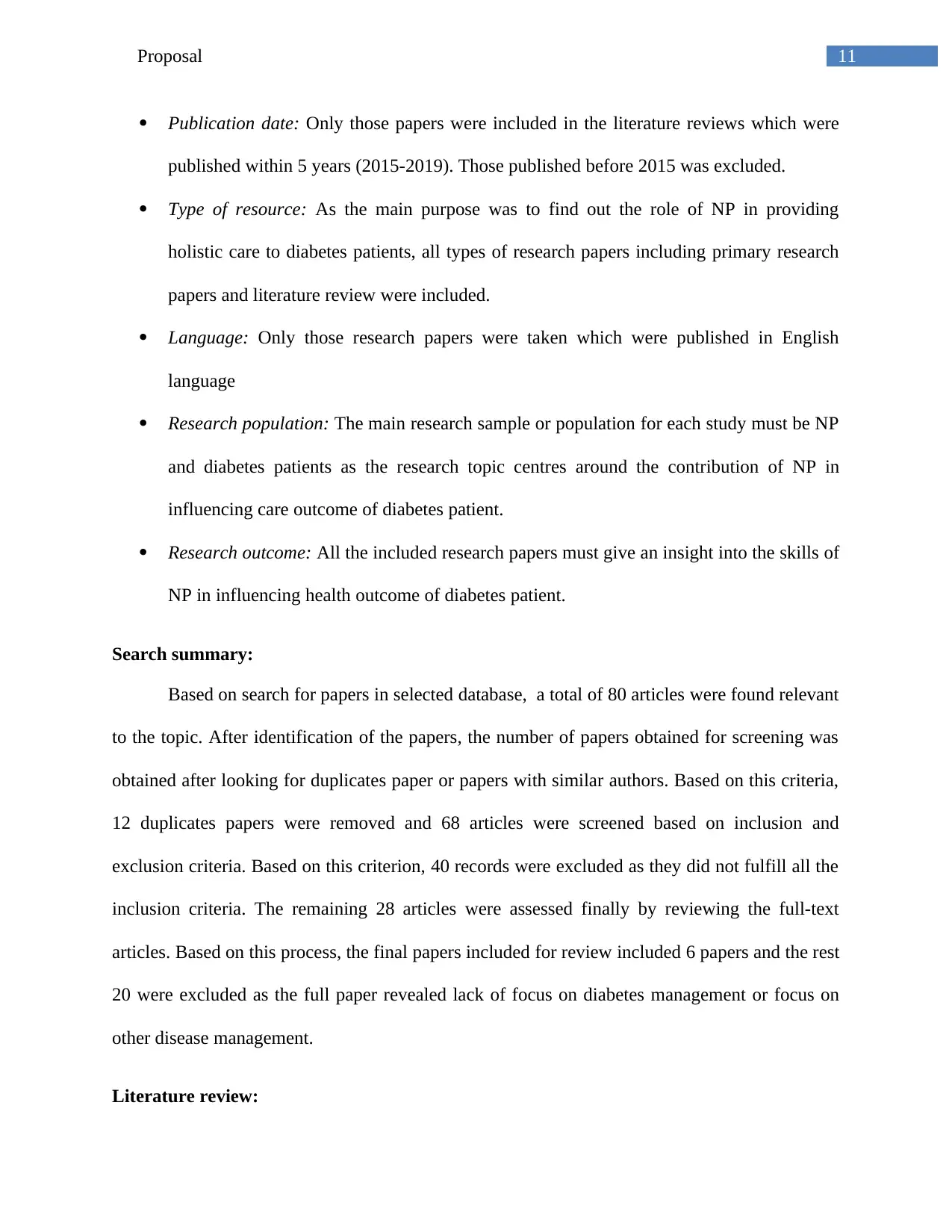
11Proposal
Publication date: Only those papers were included in the literature reviews which were
published within 5 years (2015-2019). Those published before 2015 was excluded.
Type of resource: As the main purpose was to find out the role of NP in providing
holistic care to diabetes patients, all types of research papers including primary research
papers and literature review were included.
Language: Only those research papers were taken which were published in English
language
Research population: The main research sample or population for each study must be NP
and diabetes patients as the research topic centres around the contribution of NP in
influencing care outcome of diabetes patient.
Research outcome: All the included research papers must give an insight into the skills of
NP in influencing health outcome of diabetes patient.
Search summary:
Based on search for papers in selected database, a total of 80 articles were found relevant
to the topic. After identification of the papers, the number of papers obtained for screening was
obtained after looking for duplicates paper or papers with similar authors. Based on this criteria,
12 duplicates papers were removed and 68 articles were screened based on inclusion and
exclusion criteria. Based on this criterion, 40 records were excluded as they did not fulfill all the
inclusion criteria. The remaining 28 articles were assessed finally by reviewing the full-text
articles. Based on this process, the final papers included for review included 6 papers and the rest
20 were excluded as the full paper revealed lack of focus on diabetes management or focus on
other disease management.
Literature review:
Publication date: Only those papers were included in the literature reviews which were
published within 5 years (2015-2019). Those published before 2015 was excluded.
Type of resource: As the main purpose was to find out the role of NP in providing
holistic care to diabetes patients, all types of research papers including primary research
papers and literature review were included.
Language: Only those research papers were taken which were published in English
language
Research population: The main research sample or population for each study must be NP
and diabetes patients as the research topic centres around the contribution of NP in
influencing care outcome of diabetes patient.
Research outcome: All the included research papers must give an insight into the skills of
NP in influencing health outcome of diabetes patient.
Search summary:
Based on search for papers in selected database, a total of 80 articles were found relevant
to the topic. After identification of the papers, the number of papers obtained for screening was
obtained after looking for duplicates paper or papers with similar authors. Based on this criteria,
12 duplicates papers were removed and 68 articles were screened based on inclusion and
exclusion criteria. Based on this criterion, 40 records were excluded as they did not fulfill all the
inclusion criteria. The remaining 28 articles were assessed finally by reviewing the full-text
articles. Based on this process, the final papers included for review included 6 papers and the rest
20 were excluded as the full paper revealed lack of focus on diabetes management or focus on
other disease management.
Literature review:
⊘ This is a preview!⊘
Do you want full access?
Subscribe today to unlock all pages.

Trusted by 1+ million students worldwide
1 out of 28
Related Documents
Your All-in-One AI-Powered Toolkit for Academic Success.
+13062052269
info@desklib.com
Available 24*7 on WhatsApp / Email
![[object Object]](/_next/static/media/star-bottom.7253800d.svg)
Unlock your academic potential
Copyright © 2020–2026 A2Z Services. All Rights Reserved. Developed and managed by ZUCOL.





